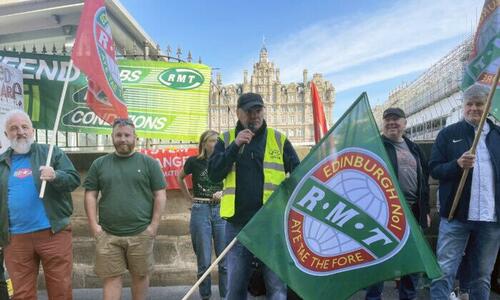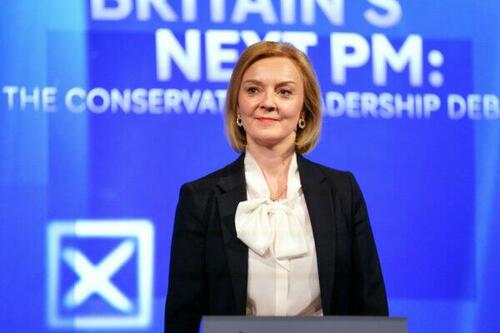
Authored by Alexander Zhang via The Epoch Times,
A union boss has called for a general strike if Britain’s next prime minister brings in legislation to crack down on industrial action that affect the country’s vital national infrastructure.
Foreign Secretary Liz Truss has pledged to ensure “militant action” from trade unions can no longer paralyse the economy if she wins the Conservative leadership contest and becomes prime minister.
Mick Lynch, general secretary of the Rail, Maritime and Transport (RMT) union, said the changes proposed by Truss will “make it virtually impossible to have effective trade unionism” and would “effectively outlaw collective action.”
“Coordinated and synchronised industrial action” would be needed if the legislation is brought in, he told the newspaper on July 27.
A general strike, which can only be called by the Trades Union Congress (TUC), is when a “substantial proportion” of workers in multiple sectors refuse to work until their demands, usually around pay and working conditions, are met.
‘Militant Unions’
Rail passengers suffered fresh travel chaos on July 27 after some members of the RMT and the Transport Salaried Staffs’ Association (TSSA) walked out on strike, crippling services across the country.
Truss said that it was “completely wrong” that passengers are “being held ransom by militant unions.”
She said if she becomes the prime minister, she would introduce legislation within 30 days to require a minimum level of service on vital national infrastructure.
Conservative party leadership contender Liz Truss at Here East studios in Stratford, east London, on July 15, 2022. (Victoria Jones/PA Media)
Tailored minimum thresholds, including staffing levels, would be determined with each industry.
The minimum threshold for voting in favour of strike action will be raised from 40 percent to 50 percent, and the minimum notice period for strike action would be raised from two weeks to four weeks, Truss said.
A cooling-off period would be implemented so that unions can no longer strike as many times as they like in the six-month period after a ballot, and members would no longer receive tax-free payments from trade unions on the days they are on strike.
Truss said “tough and decisive” actions are needed to “limit trade unions’ ability to paralyse our economy” and “cripple the vital services that hard-working people rely on.”
Labour In-Fighting
Meanwhile, the rail strike also triggered in-fighting within the ranks of the main opposition Labour Party.
The party’s shadow transport minister Sam Tarry was sacked on July 27 after he defied Labour leader Sir Keir’s ban on frontbenchers joining the picket lines.
A Labour spokesperson said: “The Labour Party will always stand up for working people fighting for better pay, terms and conditions at work. This isn’t about appearing on a picket line.”
“As a government-in-waiting, any breach of collective responsibility is taken extremely seriously and for these reasons Sam Tarry has been removed from the frontbench,” said the spokesperson.
The sacking was met with fury by trade unions and the left wing of the Labour Party.
Former Labour shadow minister John McDonnell described it as a “severe mistake.”
Gary Smith, general secretary of the GMB union, said it was a “huge own goal” for Labour to “turn a Tory transport crisis into a Labour story.”
Authored by Alexander Zhang via The Epoch Times,
A union boss has called for a general strike if Britain’s next prime minister brings in legislation to crack down on industrial action that affect the country’s vital national infrastructure.
Foreign Secretary Liz Truss has pledged to ensure “militant action” from trade unions can no longer paralyse the economy if she wins the Conservative leadership contest and becomes prime minister.
Mick Lynch, general secretary of the Rail, Maritime and Transport (RMT) union, said the changes proposed by Truss will “make it virtually impossible to have effective trade unionism” and would “effectively outlaw collective action.”
“Coordinated and synchronised industrial action” would be needed if the legislation is brought in, he told the newspaper on July 27.
A general strike, which can only be called by the Trades Union Congress (TUC), is when a “substantial proportion” of workers in multiple sectors refuse to work until their demands, usually around pay and working conditions, are met.
‘Militant Unions’
Rail passengers suffered fresh travel chaos on July 27 after some members of the RMT and the Transport Salaried Staffs’ Association (TSSA) walked out on strike, crippling services across the country.
Truss said that it was “completely wrong” that passengers are “being held ransom by militant unions.”
She said if she becomes the prime minister, she would introduce legislation within 30 days to require a minimum level of service on vital national infrastructure.
Conservative party leadership contender Liz Truss at Here East studios in Stratford, east London, on July 15, 2022. (Victoria Jones/PA Media)
Tailored minimum thresholds, including staffing levels, would be determined with each industry.
The minimum threshold for voting in favour of strike action will be raised from 40 percent to 50 percent, and the minimum notice period for strike action would be raised from two weeks to four weeks, Truss said.
A cooling-off period would be implemented so that unions can no longer strike as many times as they like in the six-month period after a ballot, and members would no longer receive tax-free payments from trade unions on the days they are on strike.
Truss said “tough and decisive” actions are needed to “limit trade unions’ ability to paralyse our economy” and “cripple the vital services that hard-working people rely on.”
Labour In-Fighting
Meanwhile, the rail strike also triggered in-fighting within the ranks of the main opposition Labour Party.
The party’s shadow transport minister Sam Tarry was sacked on July 27 after he defied Labour leader Sir Keir’s ban on frontbenchers joining the picket lines.
A Labour spokesperson said: “The Labour Party will always stand up for working people fighting for better pay, terms and conditions at work. This isn’t about appearing on a picket line.”
“As a government-in-waiting, any breach of collective responsibility is taken extremely seriously and for these reasons Sam Tarry has been removed from the frontbench,” said the spokesperson.
The sacking was met with fury by trade unions and the left wing of the Labour Party.
Former Labour shadow minister John McDonnell described it as a “severe mistake.”
Gary Smith, general secretary of the GMB union, said it was a “huge own goal” for Labour to “turn a Tory transport crisis into a Labour story.”






